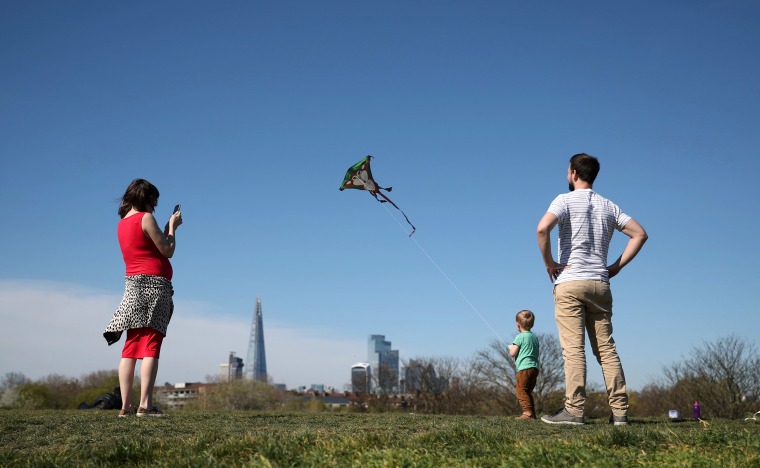Because of the coronavirus pandemic and state stay-at-home orders, Western children are experiencing loneliness, fear and confusion similar to what I have seen in refugee children both globally and in the United States.
A study by World Vision released on April 16, for instance, showed that one-third of 5 to 18 year olds in the U.K. have told their parents that they’re lonely since schools shut down. More than 1 in 5 (22 percent) are concerned about a family member or close friend dying from coronavirus. Younger children were more likely to worry about contracting coronavirus; 5 to 11 year olds were more likely to become clingy, cry or have tantrums and disturbed sleep; and those over 12 were more likely to become withdrawn.
During complex humanitarian emergencies, child protection staff try to get school-aged children back to school as soon as possible, since that is where they learn to socialize, problem-solve and assert their independence. Schools also provide safety, routine, structure and a sense of normalcy for children.
But getting children with trauma back to their educational institutions quickly is not and will not soon be possible while the COVID-19 pandemic continues.
So how then can we manage our children’s social and emotional needs? We as parents have to shift our expectations and know that we can (or can learn how to) provide children with what they need to thrive during these times: an emotional scaffolding of personal agency, safety and meaning.
Like adults, children need to feel a sense of agency and mastery, because feeling confident and competent protects against feeling helpless. No one likes the feeling of helplessness; it’s a primary emotion that often underlies anger and anxiety.
Thus, during times of external uncertainty — like the pandemic — we must help them build a sense of internal certainty. Children might feel a sense of mastery by watching the same online educational video, playing the same game or reading the same book repeatedly, for many of the same reasons that you like binging shows you've already seen: It’s predictable, and they feel confident in knowing the outcome.
Beyond that, inquire about the inner lives of children rather than just assuming that they are struggling with loneliness and grief. Observe their behaviors — sleeping, eating, playing — and ask how they are doing in gentle ways that allow them narrative control: “What are you thinking about now?” or “How do you think your friends are doing?” If they say they miss school, use the opportunity to be curious — “What part? Is it one particular friend?”
That then allows you to provide validation (one of the best ways to show support) or engage with them in problem solving, reinforcing their feelings of mastery: “Should we write them a letter? Do a video chat? Make them a present?”
Finally, you can use your time together to personally evaluate your children’s strengths and support them by encouraging a creative display of their talents, whether that's in art, baking, sports or writing, for example.
Children (and parents) also need to feel safe during times like these, beyond simply ensuring that they are physically sound. With so many schools closed, you can build a sense of safety through structure and routine. It need not (and perhaps should not) mean rigid hourly schedules, but give your child a general sense of what will happen each day.
Rituals also provide predictability, which is particularly important when everything else feels unpredictable. Did you used to have Sunday dinners together? Pizza Fridays? Thursday night games? If we didn’t have these family rituals before, this is an opportunity to develop them now.
Maintaining and strengthening your own personal and physical boundaries in addition to your child's is also important to feeling a sense of safety. Children pick up on and react to our emotions. If a partner’s need to constantly discuss the pandemic is causing you anxiety, your children will react to that. Thus, you should strengthen your own personal boundaries by communicating your own needs for safety, including creating physical boundaries or providing for alone time in separate rooms, to build mental strength through solitude.
Finding meaning in the midst of uncertainty can seem difficult, but it might just be a matter of being more clear about what is already there. All families have implicit values that they can make explicit. If you normally volunteer as a family, bake welcome treats for new neighbors or make cards for nursing home residents, you likely value gratitude, generosity or kindness. If your family participates in walks or races, camps, hikes, rides bikes or plays sports together, you likely value physical exercise, nature and perhaps perseverance.
Use this time to consider what values are meaningful to your family — perhaps: integrity, accountability, diligence, love, creativity, personal growth, knowledge, appreciation, patience, wisdom, or compassion — and challenge yourselves and children to find ways to enact those values, whether that's participating in the nightly rounds of applause for first responders, or making masks for people who don't have them, or learning a new skill together.
Our children need us to help them grow, and to see how to do so during this pandemic and the resultant social distancing. If we can provide this for the next few months or the next year, we’re priming them for when they do return to school. Then, whatever that return may look like, they’ll have a better chance at feeling emotionally stable and able to manage the challenges.






